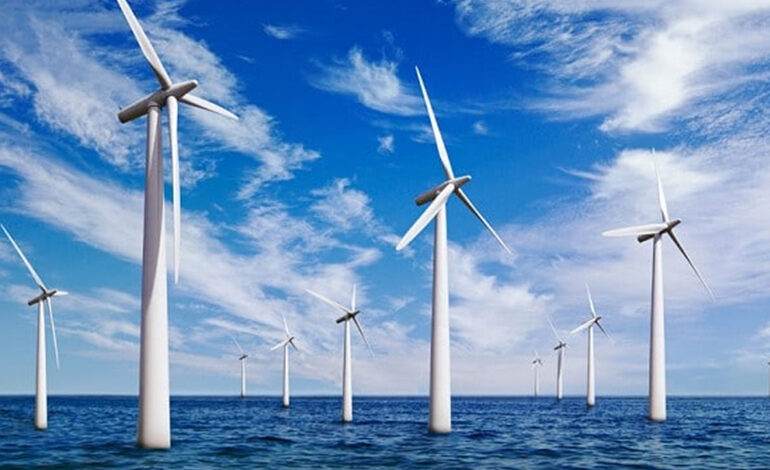Offshore Oil Rigs Off Wales Impact Offshore Wind Farm

Massive wind farms off the coast of Britain may not be built due to obscure legislation on oil company rights to offshore fossil fuel discoveries.
According to a report in the Daily Telegraph, legislation relating to the rights of oil companies to offshore fossil fuel deposits could jeopardize the development of offshore wind farms along the coast of Wales.
The projected projects include a 250-turbine wind farm 10 miles off the coast of Wales, and the UK Government wants to build around 7,000 turbines offshore over the next 10 years. However, the rules for leasing the sea bed currently state that wind turbines will have to be moved if an oil-drilling license is awarded. Oil rigs could force out offshore wind farms in Britain,”
Offshore Wind Farms are More Consistent Producers of Energy
Offshore wind farms are already in commercial operation in small to mid-range scales – from 4MW to just over 100MW – particularly in the North Sea off Denmark, Germany, the Netherlands and the UK. These wind farms – Denmark’s 160 MW Horns Rev Offshore Wind Farm and the 160 MW Nysted Wind Project – are the most significant offshore wind projects currently producing electricity. The Danish government aims to have at least 4000 MW wind capacity in Danish waters by 2030. There are more than ten projects currently in construction or in the planning stages around Denmark.
Will Environmentalist Lobbying Force Government to Change the Law?
The green industry in the U.K. and the powerful fossil fuel lobby have been at loggerheads for some time over the future development of the coastal waters around the U.K., with the fossil fuel supporters seeking opportunities to develop natural resources such as oil and the environmentalists promoting renewable energy sources like the proposed offshore wind farms. At present, the obscure law which grants the oil industry first rights to offshore resources has not been tested in court. However, if it does come to a court challenge, the concern on the part of the environmentalists is that legal action will force energy companies to delay or even terminate the construction of wind farms, on the off chance that oil is discovered in the same coastal area as the wind farm is to be located.
On the other side of the issue, oil companies complain that wind farms pose a problem for mobile drilling rigs by disrupting drilling operations and even threatening the safety of the helicopters used to service the oil rigs and transfer employees to and from the rigs.
Termination of Existing Rights
Environmental organizations, such as the World Wildlife Federation (WWF), are keeping an eye on the soon-to-be-announced Energy Bill, insisting that it contain appropriate passages that prioritise wind energy development. “For years, the oil and gas industries have benefited from a favourable environment with tax breaks, which are still granted today, and more recently with an exemption from the licensing rules of the Marine and Coastal Access Act 2009. The UK Government really must shift the focus of its policy away from oil and gas and instead support the renewable energy industry, which is the industry of the future,” said a spokesperson for the WWF.
Both Offshore Wind and Oil are Needed
While the Department of Energy and Climate Change has confirmed that there is a clause enabling all or a part of a lease to be voided on a fossil rights issue, the situation has not yet occurred. “The government believes that both the offshore wind farm industry and the oil and gas industries are necessary and can successfully co-exist in our oceans to ensure the nation’s energy needs are met,” a spokesman for the government said.
“In the unlikely circumstance that it proved not possible to access oil or gas discovery without adjusting an already approved wind farm, there is a clause in the wind farm location lease which allows all or part of the site lease to be terminated by The Crown Estate at the recommendation of the government. “If necessary, the first effort to resolve any issue would require negotiations between the parties to seek a reasonable solution to be suggested to the wind farm owner. It would not be our first choice to intervene.”
Onshore Wind Farms Facing Protests
The impact of these brewing and potential legal battles is already being felt in the current approval cycle of wind farm developments. The chilling effect of this murky legal situation in the U.K. is reflected in the fact that only one of three proposals to build onshore wind farms has received approval to proceed. Local protesters in the U.K., much like those in other jurisdictions (Ontario, parts of the U.S.), are campaigning against the building of wind turbines. To illustrate that there is a strong and growing backlash against wind power development in the U.K., in 2009, more than 50 per cent of wind farm developments on land were approved, compared to just one-third of wind power projects this year.
It is fair to say that wind power development faces legal hurdles in several jurisdictions, either based on resource-development issues and rights or on the health issues of those who live close to wind farms. In one study, the demographics indicated that older members of the population are far more likely to oppose wind energy developments than people under 35.








